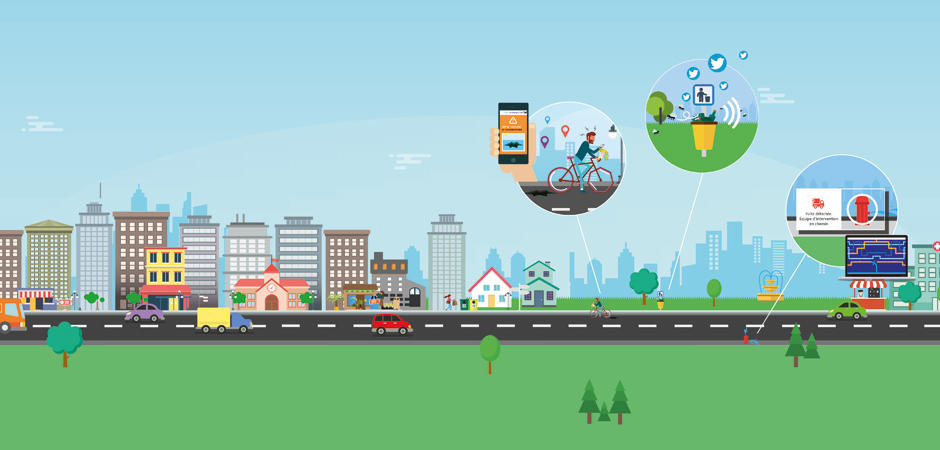The Growing Conflict between Smart Cities and Digital Sobriety
As technology has evolved, the promise of the ‘smart city’ has drawn ever closer but there is a growing concern about the environmental cost of the digital technology that makes this a reality.
Integrated smart cities are the promise of the future
Scenes of shimmering skyscrapers connected by automated high speed mass transit were once only found in Science Fiction, but as our technology has evolved, the promise of the futuristic ‘smart city’ has drawn ever closer. In the current vision, the city of the future includes possibilities that begin with the mundane but necessary: Automated lighting to save electricity, interconnected and self-adjusting traffic lights to reduce road congestion and digital credentials held on a smartphone, but continue on to the fantastical, such as modular pavement planning that changes color to signal pedestrian or vehicular usage.
All of this is to be underpinned and powered by increasingly complex algorithms, machine learning and super-fast data transfer technology like 5G and its successors. With the continuing influx of people away from rural areas and into major cities, especially in Asia, Africa and Latin America, governments and private enterprises are investing in smart city technology. But there is a growing concern about the environmental cost – the so-called ‘Carbon Thumbprint’ – of our love of the internet, data, and computing that will create this future city.
The unseen emissions costs of our technology
Few people remain unaware of the environmental cost of mining, manufacturing and shipping technology. But the piece that makes our technology so powerful – the internet – is not often thought of in the equation. Cloud computing, video streaming, block chain; everything on the internet exists because a server or computer is running constantly to transfer, store, and calculate. The Shift Project, a think tank that advocates shifting to a post-carbon economy, estimates that our digital technologies are responsible for 4% of greenhouse gas emissions, a figure expected to double by 2025 and increasing at a rate of 8% per year.
Climate activists have already turned their ire to block chain technology, specifically crypto currency mining, for the pollution produced by powering the data centers behind block chain. If no efforts are made, the digital sector will end up overtaking the automotive sector in terms of CO2 emissions within a few years.
In the face of this rising environmental cost of our digital technology, the term ‘digital sobriety’ has entered the lexicon as an approach that aims to reduce the environmental impact of digital technology. The question then becomes one of whether the ‘smart city’ is compatible with this new approach. Does the promise of better efficiency in our cities off-set the additional energy costs of the technology required to make it function?
Can renewables solve the problem without action?
Some might question whether we need digital sobriety at all. Unlike automobiles and aviation, digital technology only causes greenhouse gas emissions because the energy is created by burning fossil fuels. The International Energy Agency expects renewables to generate 80% of global energy within the next decade. Rather than reducing our usage of digital technology should we instead simply ramp up usage of renewable energies?
Unfortunately it isn’t that simple. According to Robert Lee, Professor of Law at the University Of Birmingham, UK, mining the metals we require for digital technology is one of the major polluting processes, and there is a danger we simply replace the hydrocarbon-based economy with a metal-economy. Instead of mining coal, we mine lithium for battery manufacturing. This comes at a time when the European Union is already bracing to deal with a deluge of dead batteries that are difficult and costly to recycle, so renewable energy alone is probably not the answer.
What can be done to reduce the impact of digital technology?
Think tanks like The Shift Project advocate an individual approach involving small steps from everyone like:
- Go to meetings without a phone or laptop
- Switch off devices
- Avoid printing unless necessary
- Produce lower-resolution videos
- Buy computers that will last longer
- Do not reply to every email
While still others advocate a more legislated approach to incentivize enterprises to adopt a digitally sober workplace.
Ultimately however, there are too many unknowns and little real-world data – a smart city that reduces traffic congestion, street-light usage and water waste may already result in a net reduction in the city’s carbon footprint, or it may not. One thing is certain however: The ever-increasing energy demands of our digital age will be a major part of the conversation in coming years.
Sources : veolia.com

















There are no comments
Add yours